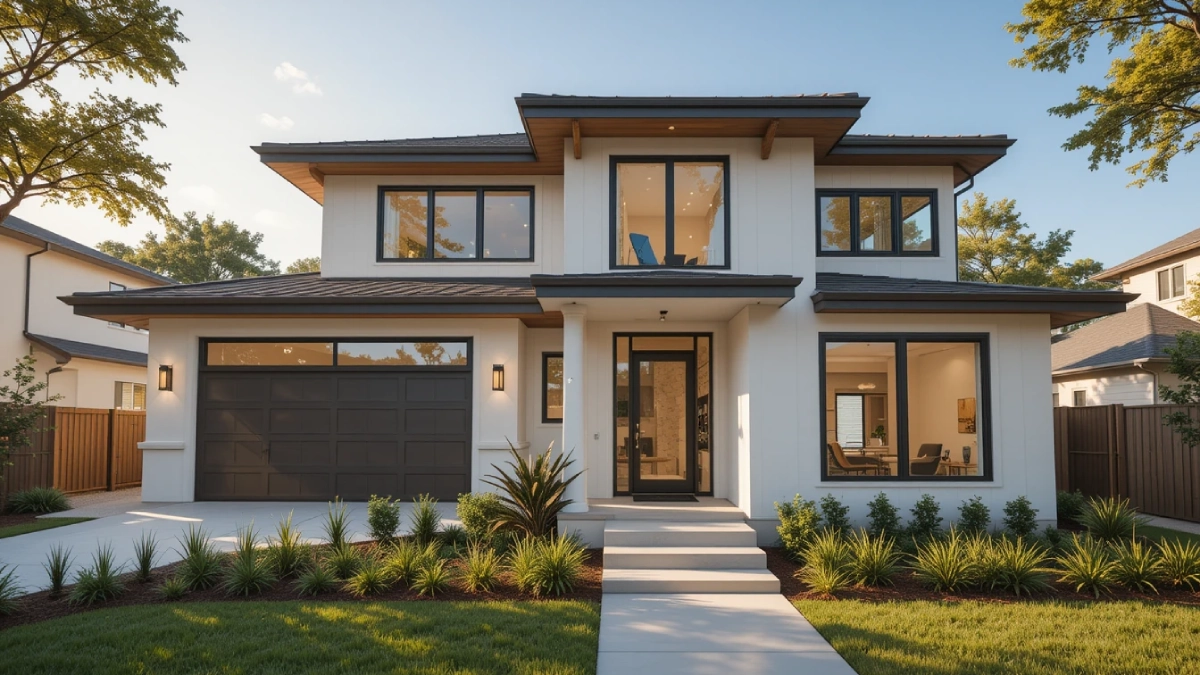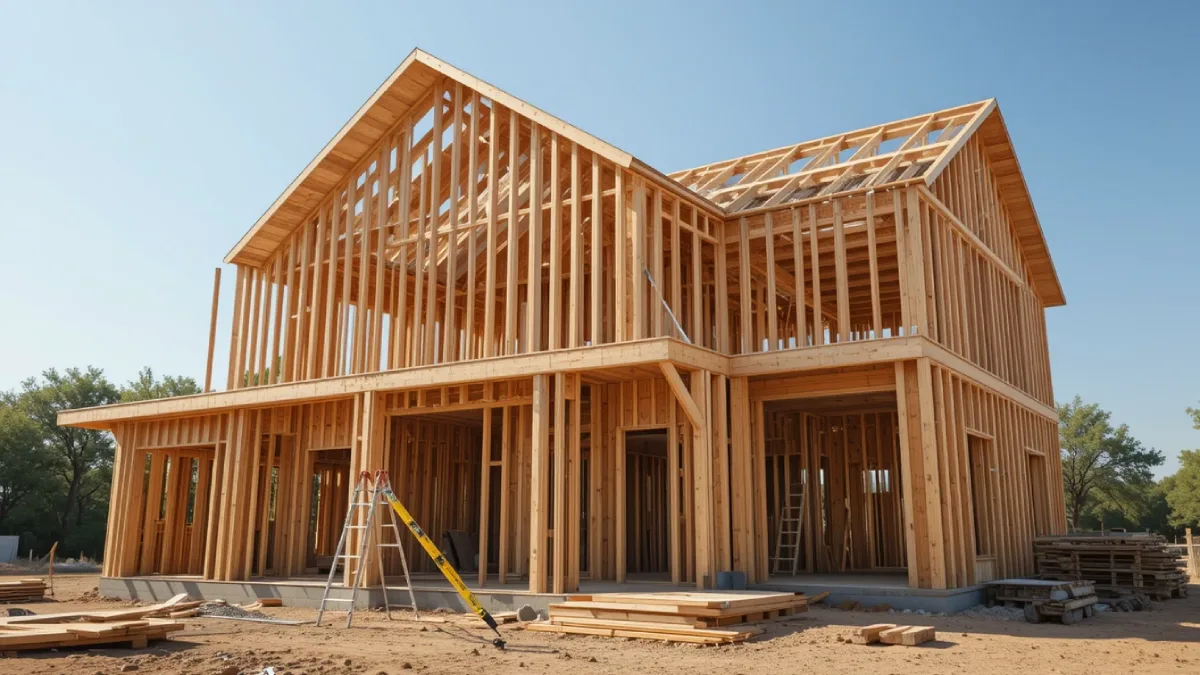Building a home is a big deal. Just like a solid foundation, strong framing is also essential. Think of framing as your home’s skeleton—it holds everything together. The walls, the floors, the roof—it’s all connected through this framework.
In places like Austin and Georgetown, where the weather can shift quickly from sunny skies to stormy nights, a well-built frame also provides resilience. It protects against moisture, intense heat, and strong winds. If your framing isn’t done right, it could cause issues down the line, from sagging walls to insulation problems. That’s why hiring a skilled contractor for this phase is so important.
When your frame is strong, your home is safer, more energy-efficient, and built to last.
What Is Framing & Structural Work?
Framing is the process of shaping your home. It’s the blueprint turned real—walls, rooflines, and floors take shape through either wood or steel construction. This structural work includes everything from laying down the floor joists to installing headers, beams, and wall studs.
Structural framing must meet strict local codes. These rules ensure the safety and durability of the home. If it doesn’t pass inspection, everything else gets delayed. And fixing framing issues later? That’s expensive and time-consuming.
Good framing also helps other trades do their jobs. Electricians, plumbers, and drywall crews depend on well-aligned, properly spaced framing. So when you invest in the right framing contractor, you’re setting up the entire project for success.
Traits of a Good Framing Contractor
Not all contractors are cut from the same cloth. Some show up late. Others overpromise and underdeliver. So what should you look for?
Here are the signs of a top-notch framing contractor:
- Licensed and insured: This protects you from liability.
- Local experience: They are familiar with local codes and what inspectors expect.
- Strong reviews: Consistently good feedback is a major green flag.
- Fair pricing: Not cheap, but competitive and clear.
- Great communication: They return your calls and explain things clearly.
Want a bonus tip? Ask them if they’ve worked in your neighborhood. Framing contractors familiar with your area can help you avoid common challenges, such as soil issues, weather delays, or zoning quirks.
Questions to Ask Before You Hire
Interviewing framing contractors isn’t awkward—it’s smart. A great contractor will welcome your questions and be happy to answer. Here’s a checklist to help guide your conversation:
- How long have you been doing framing work?
- Are you licensed and insured in this state?
- Can I see a portfolio of your recent work?
- Do you offer structural work as part of your services?
- What materials do you usually use?
- What’s included in the quote?
- How long will the job take from start to finish?
- Will you handle permitting, or should I?
Their answers will help you judge not just experience, but also professionalism. Don’t feel pressured to decide on the spot—gather info, take notes, and compare your options.
How to Compare Quotes the Smart Way
Once you’ve gathered a few quotes, it’s time to make comparisons. But this part isn’t just about finding the lowest number. Here’s what to focus on:
- Scope of work: What’s included?
- Materials: Are they using high-quality lumber or the cheapest stuff?
- Labor and timeline: How many workers will be on-site, and how long will it take?
- Extras: Will they handle cleanup or material delivery?
- Red flags: Vague language, lack of a written contract, or unclear timelines.
Always get your quote in writing. Don’t settle for a “rough estimate.” If something seems too good to be true, it usually is. The best contractors are clear, honest, and upfront.
DIY Builders: Why You Still Need Pros
Thinking of building your home yourself? That’s a big and exciting step. But even if you’re managing most of the build, don’t skip the pros when it comes to framing.
Here’s why:
- Framing requires precision: Measurements must be exact. One wrong angle or misaligned wall can throw everything off.
- It’s physically demanding and fast-paced: Lifting, cutting, and installing large beams takes experience.
- You need permits and inspections: Professionals know what local inspectors look for.
- You’ll save time and money: A pro can frame a house in a fraction of the time it would take a DIYer.
If you’re going the owner-builder route, consider hiring a framing contractor as a way to buy peace of mind. You’re still in control, but you’re relying on expert help where it matters most.
How to Check Reviews and Credentials
Don’t just go by star ratings—dig deeper. When researching framing contractors, look at both the quantity and quality of reviews. A 5-star average with just two reviews isn’t as helpful as a 4.7 rating from 50 clients.
Here’s where to look:
- Google and Yelp: Look for consistency in customer experiences.
- Houzz or Angie’s List: These platforms often verify credentials.
- Better Business Bureau (BBB): Check for unresolved complaints.
- State license boards: Verify that the contractor is currently licensed.
Also, ask for proof of insurance. If they hesitate or delay, move on. Good contractors take pride in their credentials.
What to Expect During Framing
Once the foundation is poured, framing begins. This part of the process usually takes 1 to 3 weeks, depending on the size and complexity of the home.
Here’s the typical order:
- Floor framing: The subfloor is built first.
- Wall framing: Interior and exterior walls are erected.
- Roof framing: Trusses or rafters are placed.
Expect some inspections during or after the process. These include framing checks, nailing patterns, and tie-down hardware. Your contractor should coordinate these with the local inspector.
Even if you’ve hired a general contractor, it’s smart to walk the site with the framer or project manager. Look for anything that doesn’t seem right. This is your last chance to fix issues before insulation and drywall cover everything.
How To Hire the Right Framing Contractor
Ready to find the right framing contractor? Follow this simple plan:
- Create a list: Ask friends, check online, and make a shortlist.
- Review their credentials: License, insurance, and reviews.
- Call for a quick chat: Ask key questions and see if they’re a fit.
- Schedule site visits: Have them see your property or plans.
- Request written quotes: Compare side-by-side.
- Check references: Speak with at least one past client.
- Make your choice: Choose the one with the right balance of skill, cost, and communication.
Taking a few extra steps now can save you from costly mistakes later.
Final Thoughts
If your framing is bad, your whole house suffers. That’s why picking the right contractor is so important. A poor frame leads to structural issues, costly repairs, and failed inspections. On the flip side, great framing gives your home strength, stability, and lasting value.
Take your time. Ask questions. Check reviews. Choose someone who knows your city and your needs. Don’t rush this step—your entire build depends on it.
Whether you’re starting in Austin, Georgetown, or somewhere else, your dream home begins with a solid foundation. Make it count.
Ready to custom build your own house? Need help with framing and structural work? Whether you’re building in Austin or Georgetown, we’ve got you covered.
Contact our team today and get a free quote!
We offer expert framing, clear pricing, and local knowledge that gets the job done right.
Build smart. Build strong. Build with confidence.
FAQs
A framing contractor builds the structural framework of your home, including walls, floors, and the roofline.
Yes. Most cities require a permit for any type of structural work. Your contractor should help obtain it.
Typically, framing takes 1 to 3 weeks, depending on the size and layout of the project.
Costs vary widely based on size, materials, and labor, but it’s best to get a custom quote.
Technically, yes. But without experience, it’s risky. Small mistakes can cause major delays or safety issues. Hiring a professional is safer.

